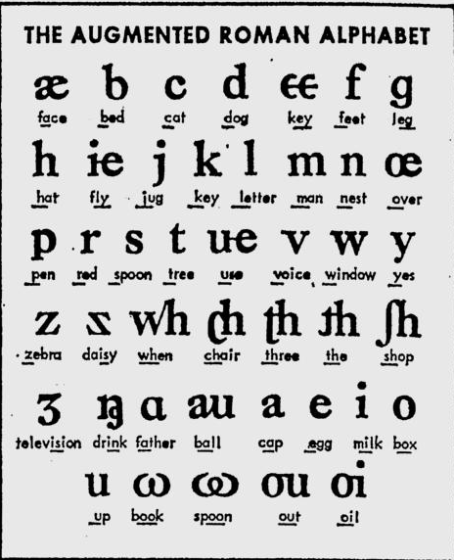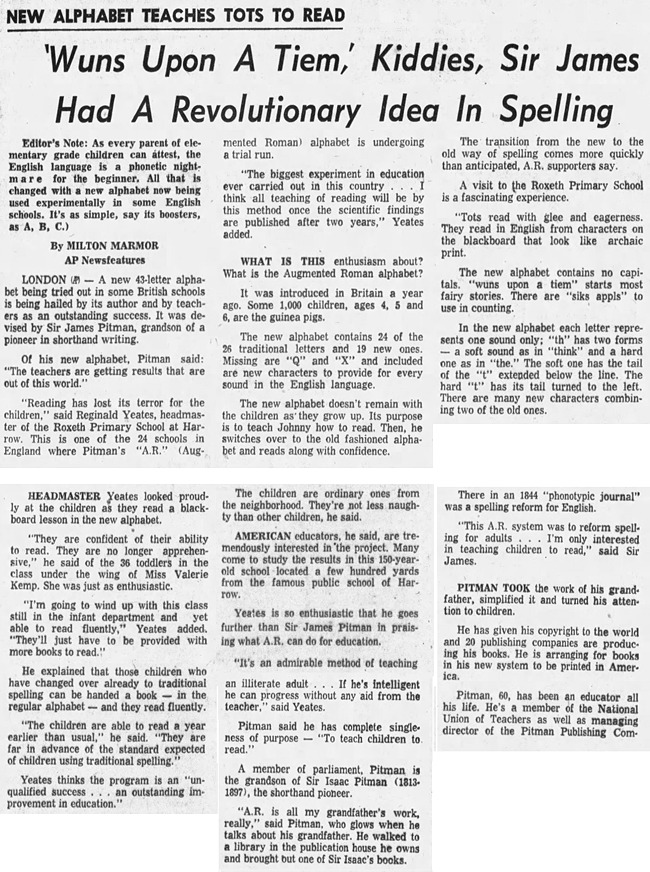Augmented Roman
Augmented Roman was one of the periodic attempts to improve and rationalize the English alphabet. Introduced in the 1960s by Sir James Pitman, the idea was to expand the alphabet from 26 letters to 43, and to have each letter represent a single, distinct sound. Unlike the current alphabet in which letters can have different sounds depending on context.
Proponents of Augmented Roman imagined teaching children to read using this improved alphabet, and then having the kids switch over to the standard alphabet later. And that's where the plan ran aground, because most people figured that if kids have to learn the standard alphabet anyway, just teach them that from the beginning.



Proponents of Augmented Roman imagined teaching children to read using this improved alphabet, and then having the kids switch over to the standard alphabet later. And that's where the plan ran aground, because most people figured that if kids have to learn the standard alphabet anyway, just teach them that from the beginning.

image source: omnivorenz

Tampa Bay Times - Sep 2, 1962

Tampa Bay Times - Sep 2, 1962
Comments
It solves some 'problems' (e.g., every C in "Pacific Ocean" is pronounced differently), but what about homonyms (can (am able/tin container), duck (bird/evade), bat (Louisville Slugger/Dracula's nephew), etc.) and homophones ("I sell cell phones," "Tacos? I had four for lunch," "Our safe word was 'flour,' but she kept saying 'flower,'" etc.)?
I'd embrace this idea more fully if it had fifty-six letters instead of forty-three. Years ago, I created a numerical system (value can be determined from the glyph, arithmetic is easier, etc.) for a story and always wanted to construct a language from it, but the phonetics always defeats me.
I'd embrace this idea more fully if it had fifty-six letters instead of forty-three. Years ago, I created a numerical system (value can be determined from the glyph, arithmetic is easier, etc.) for a story and always wanted to construct a language from it, but the phonetics always defeats me.
Posted by Phideaux on 10/25/19 at 09:38 AM
I thought I recognised this: it's the "Initial Teaching Alphabet" (which has an article on Wikipedia). Presumably the name was changed at some point.
Posted by Stuart on 10/26/19 at 03:07 AM
I remember vaguely a short story, no longer than three pages or so, where the author argued for simplifying written English in order to eliminate homophones and homonyms. The text gradually took on these simplifications as it progressed so that by the conclusion it was something that required hard concentration to make sense of. It was a tongue in cheek story and very funny. I regret that I cannot remember the author's name or title and search engines are no help.
Posted by KDP on 10/26/19 at 03:21 PM
@KDP -- Do you mean "MEIHEM IN CE KLASRUM" by Dolton Edwards (W. K. Lessing), Astounding Science Fiction, 1946?
Posted by Phideaux on 10/26/19 at 05:05 PM
Here's the thing in video.
https://www.youtube.com/watch?v=A8zWWp0akUU
https://www.youtube.com/watch?v=A8zWWp0akUU
Posted by Yudith on 10/27/19 at 07:40 AM
Phideaux, whatever you're being paid isn't enough. That's exactly what I've been looking for for some forty years. I've mentioned the idea when lecturing my linguistically challenged friends who can't remember the difference between "there" and "their" when referring to people.
Posted by KDP on 10/27/19 at 10:40 AM
Yudith, your example sounds much like examples of Old English passages a high school teacher had us study when we tackled "Beowolf."
Posted by KDP on 10/27/19 at 10:48 AM
Commenting is not available in this channel entry.

Category: Education | Languages | 1960s